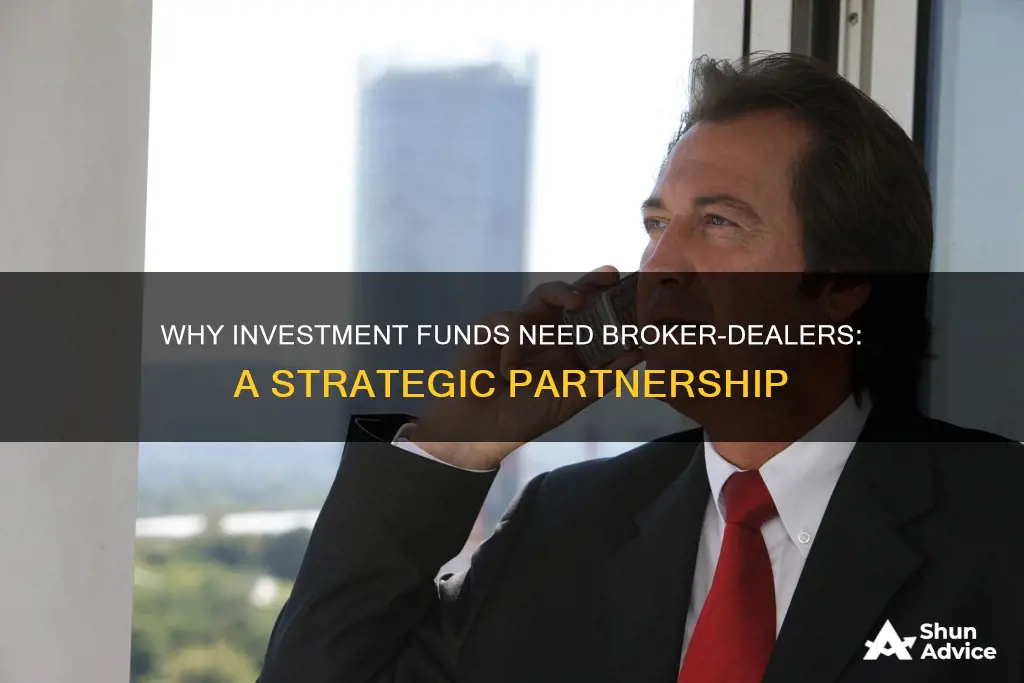
Private investment funds use broker-dealers to help them raise capital in a private placement offering. A broker-dealer can sell securities for clients and for themselves, and they are compensated through fee-based services and commissions on funds raised.
Broker-dealers are registered with the Securities and Exchange Commission (SEC) and the Financial Industry Regulatory Authority (FINRA). They are required to be members of the Securities Investor Protection Corporation (SIPC) and are subject to its regulations.
Broker-dealers can assist private investment funds in creating their private placement memorandum, sales presentation, executive summary, and other documents. They can also coach them on presentation methods and techniques or make presentations with or on behalf of the fund.
Additionally, a reputable broker-dealer signing off on a private investment fund's offering reduces an investor's risk. The prospective investor knows that a broker-dealer has done its own due diligence on the fund before agreeing to work with them.
In the United States, broker-dealers are regulated under the Securities Exchange Act of 1934.
What You'll Learn
- Broker-dealers are required to perform due diligence on all deals before offering them to an investor
- They must perform due diligence on company owners and executives before offering a deal
- Broker-dealers must provide all material facts to investors
- They must obtain information about their clients to determine if they are accredited investors
- They must collect financial information on investors to determine if the investment is suitable

Broker-dealers are required to perform due diligence on all deals before offering them to an investor
The due diligence process for broker-dealers can be broken down into several key steps. Firstly, they must conduct a comprehensive investigation and audit of the potential deal, including a review of the corporate structure, business plan, and management team. This involves analyzing financial records, such as financial statements, books, and tax exposure, as well as assessing the company's market share, competitive positioning, and growth opportunities. Additionally, broker-dealers must review the offering documents, risk disclosures, and litigation history to identify any potential risks or issues.
Another crucial aspect of due diligence for broker-dealers is performing background checks and evaluating the company owners and executives. This includes verifying their qualifications, experience, and any relevant regulatory or legal issues. By doing so, broker-dealers can assess the credibility and competence of the individuals involved in the deal.
Furthermore, broker-dealers are required to provide all material facts to investors. This means disclosing all risks associated with the investment, as well as any information that could impact the investment decision. Broker-dealers must also obtain information about their clients, including their accreditation status, financial situation, and investment objectives, to ensure that the investment is suitable for them.
To ensure compliance with regulations, broker-dealers must adhere to strict rules set by regulatory bodies such as the Securities and Exchange Commission (SEC) and the Financial Industry Regulatory Authority (FINRA). They are obligated to comply with anti-money laundering rules and know-your-customer (KYC) regulations. Additionally, broker-dealers must disclose any conflicts of interest and ensure that all information provided to investors is fair, balanced, and not misleading.
The due diligence process also extends beyond the initial investigation. Broker-dealers are responsible for ongoing monitoring of the company and providing investors with updates as they become available. This helps investors stay informed about any changes or developments that may impact their investment.
By conducting thorough due diligence, broker-dealers can minimize risk, ensure compliance with regulations, and provide their clients with the necessary information to make informed investment decisions. It is a critical step in the investment process that helps protect the interests of investors and maintain the integrity of the financial industry.
Choosing a Fund: Key Factors for Smart Investing
You may want to see also

They must perform due diligence on company owners and executives before offering a deal
Broker-dealers are required to perform due diligence on company owners and executives before offering a deal. This is a critical step to ensure that investors' interests are protected and that the deal is legitimate. Here are four to six paragraphs elaborating on this topic:
Due diligence is an essential process in any investment transaction, and it is especially crucial when dealing with private investment funds and broker-dealers. Before offering a deal, broker-dealers must conduct extensive research and analysis to ensure that the company owners and executives are trustworthy and reputable. This includes verifying their identities, assessing their track record, and evaluating their financial stability. Due diligence helps protect investors from potential fraud or misconduct.
The due diligence process involves examining various aspects of the company and its owners and executives. Broker-dealers will typically review financial records, business plans, and legal documents. They may also conduct background checks and interview key personnel to gain a comprehensive understanding of the company's operations and the individuals running it. This process helps uncover any potential red flags or risks associated with the investment opportunity.
One critical aspect of due diligence is evaluating the company's management team. Broker-dealers will assess the qualifications, experience, and reputation of the company's executives. They will look for a track record of success, ethical business practices, and strong leadership skills. This ensures that the company is in capable hands and reduces the risk of mismanagement or fraudulent activities.
Another important consideration is the company's financial health and stability. Broker-dealers will analyze financial statements, revenue projections, and existing debt obligations. They will assess the company's profitability, cash flow, and ability to generate sustainable returns. This financial due diligence helps investors understand the potential risks and rewards of the investment opportunity.
In addition to financial due diligence, broker-dealers will also evaluate the company's products, services, and market position. They will assess the competitiveness of the company's offerings, its market share, and its growth potential. By understanding the company's business model and industry standing, broker-dealers can better gauge the viability of the investment opportunity.
The due diligence process is not just a box-ticking exercise; it is a critical component of responsible investing. It helps broker-dealers make informed decisions and ensures that investors are provided with accurate and comprehensive information. By performing due diligence on company owners and executives, broker-dealers play a vital role in mitigating risks, protecting investors' interests, and promoting transparency in private investment transactions.
Nas' Venture Capital: Where Does He Invest?
You may want to see also

Broker-dealers must provide all material facts to investors
Broker-dealers are required to provide all material facts to investors. This means they must inform investors of the risks associated with the investment and any information that would be needed for an investor to make an informed decision. This is part of the broker-dealer's duty of fair dealing, which is derived from the anti-fraud provisions of the Securities Exchange Act of 1934.
The duty of fair dealing is a fundamental obligation that broker-dealers owe to their customers. It is based on the idea that by engaging in the brokerage profession, a broker-dealer represents to its customers that it will deal fairly with them, in line with the standards of the profession. This includes the duties to execute orders promptly, disclose certain material information, charge prices reasonably related to the prevailing market, and fully disclose any conflict of interest.
In addition to the duty of fair dealing, broker-dealers also have a suitability obligation. This means they must recommend only those specific investments or overall investment strategies that are suitable for their customers. To meet this requirement, broker-dealers must have an "adequate and reasonable basis" for any recommendation they make. They must also determine the customer-specific suitability by making recommendations based on a customer's financial situation, needs, and other security holdings.
To ensure compliance with these requirements, broker-dealers are subject to examination by the Securities and Exchange Commission (SEC) and self-regulatory organizations (SROs) such as the Financial Industry Regulatory Authority (FINRA). They are also required to maintain certain financial responsibility standards, including minimum net capital levels and safeguarding customer funds and securities.
By providing all material facts to investors and adhering to the duties of fair dealing and suitability, broker-dealers play a crucial role in protecting investors' interests and ensuring they have the information needed to make informed investment decisions.
Key Factors for Choosing the Right Mutual Fund Investments
You may want to see also

They must obtain information about their clients to determine if they are accredited investors
Broker-dealers are required to perform due diligence on their clients to determine if they are accredited investors and comply with Know Your Customer (KYC) rules. They must obtain information about their clients to determine if they are accredited investors. This is because accredited investors have access to unique investment opportunities that are not available to all retail investors.
Accredited investors are individuals with a certain level of income, net worth, or financial expertise that enables them to invest in alternative assets. The Securities and Exchange Commission (SEC) defines an accredited investor as someone who meets specific criteria regarding income, net worth, and qualifications.
To be considered an accredited investor as an individual, a person must meet at least one of the following criteria:
- Have an income exceeding $200,000 for the past two years with the same expectation for the next year.
- Have a net worth exceeding $1 million, excluding the value of their primary residence.
For joint accreditation with a spouse, the requirements are as follows:
- Have a joint income of $300,000 for the past two years with the same expectation for the next year.
- Have a joint net worth exceeding $1 million, excluding the value of the primary residence.
It is important to note that there is no formal process or certification for becoming an accredited investor. The burden of proving an individual's accreditation falls on the investment vehicle rather than the investor. Broker-dealers must take steps to verify the accreditation status of their clients by obtaining financial information and conducting due diligence.
Index Funds: Understanding Their Typical Investment Strategies
You may want to see also

They must collect financial information on investors to determine if the investment is suitable
Broker-dealers are required to collect financial information on investors to determine if an investment is suitable for them. This is known as the suitability requirement.
Under the rules of self-regulatory organisations (SROs), when a broker recommends that a customer buy or sell a particular security, they must have a reasonable basis for believing that the recommendation is suitable for that customer. To make this assessment, the broker must consider the customer's risk tolerance, other security holdings, financial situation (income and net worth), financial needs, and investment objectives.
In the US, the Financial Industry Regulatory Authority (FINRA) is responsible for administering exams for investment professionals. The Series 7 exam, for example, covers investment risk, tax implications, equity and fixed-income securities, mutual funds, options, retirement plans, and working with investors to oversee their assets.
Broker-dealers must also comply with anti-money laundering (AML) rules and regulations. This includes the need to verify the identity of any person seeking to open an account and to determine whether the person appears on any lists of known or suspected terrorists or terrorist organisations.
In addition, broker-dealers must comply with the Securities and Exchange Commission's (SEC) "regulation best interest" rules. This means they are obligated to put the best interests of their customers ahead of their own when they make a recommendation regarding any securities transaction or investment strategy.
To ensure compliance with these various rules and regulations, broker-dealers must collect and verify certain personal and financial information from their customers. This includes information on tax identification, occupation and employment status, net worth, and account investment objectives.
By collecting and analysing this data, broker-dealers can make informed recommendations that are suitable for each individual investor. It also helps ensure that brokerage firms have an up-to-date understanding of their customers' financial situation and investment objectives.
Savings Strategy: Mutual Funds Investment Allocation
You may want to see also







